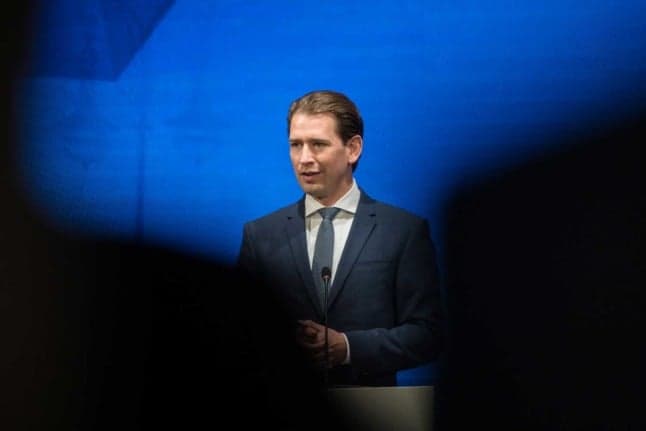EXPLAINED: Why was Austrian Chancellor Sebastian Kurz forced to resign?

Austria's top diplomat Alexander Schallenberg takes over as chancellor on Monday as the ruling party tries to emerge from a corruption scandal that cost the job of one of Europe's youngest leaders.
Sebastian Kurz, a 35-year-old once feted as a "whizz kid", said late Saturday he was quitting the top job after being implicated in a corruption scandal.
Schallenberg, 52, will be sworn in by President Alexander Van der Bellen at 1:00 pm (1100 GMT).
Kurz's centre-right People's Party (ÖVP) and their junior Green coalition partners are hoping to move on from the scandal and serve out the rest of their term until 2024.
However, the fallout from last week's events may continue to reverberate.
On Wednesday prosecutors raided several ÖVP-linked locations, including the chancellory and party headquarters, over allegations that between 2016 and 2018 finance ministry resources were used to finance "partially manipulated opinion polls that served an exclusively party-political interest".
Prosecutors allege that payments were made to an unnamed media company -- widely understood to be the Oesterreich tabloid, which was also raided on Wednesday -- in return for publishing these surveys.
The offences were allegedly committed to help Kurz, already a government minister at the beginning of the period in question, take over the leadership of the ÖVP.
'Kurz system'
While Kurz initially insisted there was no reason for him to resign -- and continues to vehemently protest his innocence -- he then reversed course, saying he was putting the country before his own interests.
But many say Kurz bowed to pressure from the Greens and from within his own party. Kurz's critics point out he will still be head of the ÖVP and will now sit as leader of its bloc in parliament -- an ideal position from which to exercise influence as a "shadow chancellor".
The opposition parties say the "Kurz system" will carry on unhindered through the presence of ministers loyal to him as well as high-ranking employees who look set to continue in post -- some of whom are also suspects in the corruption inquiry.
Until now Schallenberg had served as foreign minister under Kurz and is widely seen as being loyal.
The latest scandal to hit Kurz adds to a list of corruption allegations against the ÖVP and several of its prominent figures, including Finance Minister Gernot Bluemel.
Those allegations surfaced in the aftermath of the so-called "Ibiza-gate" affair that in 2019 brought down Kurz's first government, a coalition between the ÖVP and the far-right Freedom Party (FPOe).
Despite that Kurz came out on top in elections in autumn 2019 and re-entered government, this time at the head of a coalition with the Greens.
Schallenberg's replacement as Foreign Minister was announced by the ÖVP-controlled ministry on Monday as Michael Linhart, the current Austrian ambassador to France.
Comments
See Also
Sebastian Kurz, a 35-year-old once feted as a "whizz kid", said late Saturday he was quitting the top job after being implicated in a corruption scandal.
Schallenberg, 52, will be sworn in by President Alexander Van der Bellen at 1:00 pm (1100 GMT).
Kurz's centre-right People's Party (ÖVP) and their junior Green coalition partners are hoping to move on from the scandal and serve out the rest of their term until 2024.
However, the fallout from last week's events may continue to reverberate.
On Wednesday prosecutors raided several ÖVP-linked locations, including the chancellory and party headquarters, over allegations that between 2016 and 2018 finance ministry resources were used to finance "partially manipulated opinion polls that served an exclusively party-political interest".
Prosecutors allege that payments were made to an unnamed media company -- widely understood to be the Oesterreich tabloid, which was also raided on Wednesday -- in return for publishing these surveys.
The offences were allegedly committed to help Kurz, already a government minister at the beginning of the period in question, take over the leadership of the ÖVP.
'Kurz system'
While Kurz initially insisted there was no reason for him to resign -- and continues to vehemently protest his innocence -- he then reversed course, saying he was putting the country before his own interests.
But many say Kurz bowed to pressure from the Greens and from within his own party. Kurz's critics point out he will still be head of the ÖVP and will now sit as leader of its bloc in parliament -- an ideal position from which to exercise influence as a "shadow chancellor".
The opposition parties say the "Kurz system" will carry on unhindered through the presence of ministers loyal to him as well as high-ranking employees who look set to continue in post -- some of whom are also suspects in the corruption inquiry.
Until now Schallenberg had served as foreign minister under Kurz and is widely seen as being loyal.
The latest scandal to hit Kurz adds to a list of corruption allegations against the ÖVP and several of its prominent figures, including Finance Minister Gernot Bluemel.
Those allegations surfaced in the aftermath of the so-called "Ibiza-gate" affair that in 2019 brought down Kurz's first government, a coalition between the ÖVP and the far-right Freedom Party (FPOe).
Despite that Kurz came out on top in elections in autumn 2019 and re-entered government, this time at the head of a coalition with the Greens.
Schallenberg's replacement as Foreign Minister was announced by the ÖVP-controlled ministry on Monday as Michael Linhart, the current Austrian ambassador to France.
Join the conversation in our comments section below. Share your own views and experience and if you have a question or suggestion for our journalists then email us at [email protected].
Please keep comments civil, constructive and on topic – and make sure to read our terms of use before getting involved.
Please log in here to leave a comment.